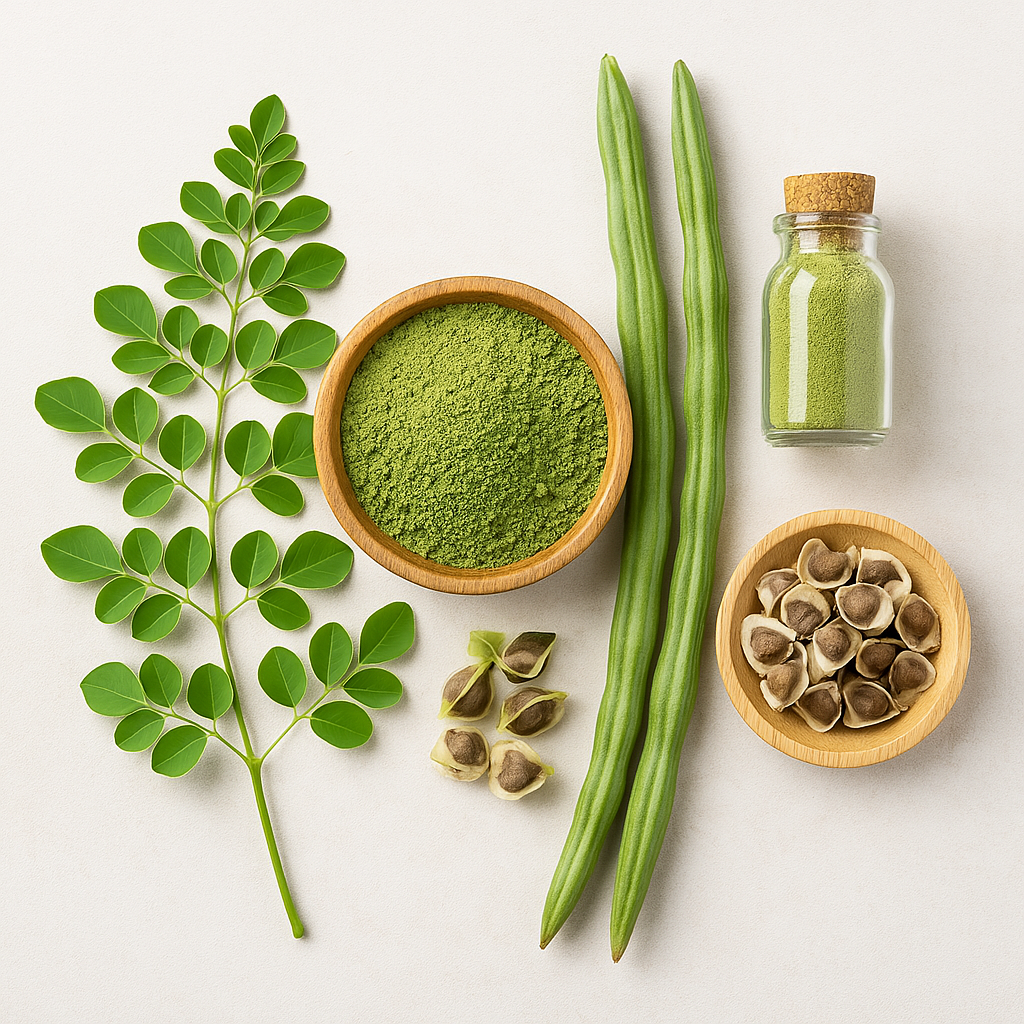🔬 Scientific Evidence & Research Supporting Moringa’s Health Claims
While moringa has deep roots in traditional medicine systems, modern science has increasingly turned its attention to validating these time-tested claims. Over the last two decades, hundreds of peer-reviewed studies have been published on moringa’s nutritional profile, bioactive compounds, and therapeutic effects.
Here’s a look at some of the most compelling research findings:
1. 🩸 Blood Sugar Regulation
A study published in the journal Phytotherapy Research (2009) evaluated the effects of moringa on post-meal blood glucose levels. It found that taking moringa leaf powder significantly reduced blood sugar spikes in type 2 diabetic patients after meals.
Result: A 21% reduction in postprandial glucose in participants who consumed moringa leaf powder.
2. ❤️ Cardiovascular Protection
A 2012 study in the Journal of Ethnopharmacology demonstrated that moringa leaf extract lowered cholesterol levels and protected heart tissues in rats. Its high antioxidant content reduced lipid peroxidation, a major factor in heart disease.
Key Components: Quercetin, chlorogenic acid, and kaempferol were shown to protect vascular health.
3. 🧠 Neuroprotective Effects
The Frontiers in Pharmacology (2018) journal published findings that moringa extracts may protect neurons from oxidative stress, showing potential as a therapeutic agent in Alzheimer’s and Parkinson’s diseases.
Note: These effects are attributed to its strong antioxidant capacity and its impact on neurotransmitter levels.
4. 🦠 Antimicrobial and Antifungal Properties
Studies published in BMC Complementary and Alternative Medicine have found that moringa leaf and seed extracts exhibit potent antimicrobial activity against several bacteria, including E. coli, Salmonella, and Staphylococcus aureus.
This explains its traditional use in:
- Water purification
- Wound treatment
- Gut infection control
5. 🧪 Cancer Prevention Potential
Moringa contains isothiocyanates and niazimicin, compounds that have demonstrated anti-cancer potential in lab studies. Research published in the journal Asian Pacific Journal of Cancer Prevention suggests moringa extracts can inhibit the growth of breast and colon cancer cells in vitro.
⚠️ These findings are early-stage and not a substitute for medical treatment, but they show immense promise for future nutraceutical development.
6. 📊 Nutritional Studies in Malnutrition
Numerous field trials in Africa and South Asia have documented moringa’s ability to reverse childhood malnutrition. Its dense protein and micronutrient content make it a life-saving crop in low-resource settings.
Example: UNICEF programs in Senegal and India have distributed moringa powder in school meal programs to improve child health metrics.
📚 Summary Table of Scientific Support
| Health Claim | Study / Journal | Conclusion |
|---|---|---|
| Blood sugar control | Phytotherapy Research (2009) | Significant reduction in glucose levels |
| Heart health | Journal of Ethnopharmacology (2012) | Cholesterol-lowering & antioxidant effect |
| Brain health | Frontiers in Pharmacology (2018) | Neuroprotection in oxidative stress |
| Antibacterial action | BMC CAM (2013) | Effective against common gut pathogens |
| Cancer-fighting potential | Asian Pacific J of Cancer Prevention (2014) | Growth inhibition in cancer cells |
| Anti-malnutrition | UNICEF / FAO Programs | Reverses nutrient deficiencies in children |
These studies provide compelling evidence that moringa is not just a folk remedy, but a scientifically validated superfood with global health relevance.
🧘 Moringa in Traditional Medicine – Ancient Healing with Modern Relevance
Long before the term “superfood” entered our vocabulary, moringa had already established itself as a powerful healing plant across traditional medicine systems. Its use is recorded in ancient manuscripts, healing rituals, and folklore — proving that moringa’s medicinal reputation is not a trend but a time-honored tradition.
🌿 1. Ayurveda (India)
In Ayurveda, India’s ancient system of natural healing, moringa (called Shigru) is considered:
- Tridoshic: Balances Vata, Pitta, and Kapha, the three biological energies
- Classified as deepana (appetizer), pachana (digestive), and lekhana (fat scrubbing or detoxifying)
Traditional Ayurvedic Uses:
| Ailment | Moringa Use |
|---|---|
| Joint pain / arthritis | Leaf decoctions to reduce inflammation |
| Skin diseases | Paste made from bark or leaves |
| Digestive issues | Leaves in diet to improve gut health |
| High cholesterol | Seeds and pods used in special diets |
| General debility | Powder as a Rasayana (rejuvenator) |
💡 Ayurvedic texts describe over 300 diseases that moringa can help prevent or treat.
🧪 2. Siddha and Unani Medicine
- Siddha (a South Indian system of medicine) uses moringa for blood purification, liver detoxification, and diabetes management.
- In Unani (a Greco-Arabic system practiced in India and the Middle East), moringa is considered hot and dry in temperament, used to:
- Treat lethargy and obesity
- Reduce inflammation and phlegm
- Stimulate sexual health (aphrodisiac use of seeds)
🌍 3. Traditional African Medicine
In Africa, moringa is known as the “mother’s best friend” due to its role in:
- Supporting lactation in nursing mothers
- Treating malaria, typhoid, and dysentery
- Healing wounds and skin infections through seed oil and poultices
- Managing hypertension and diabetes through boiled leaf infusions
Countries like Nigeria, Kenya, and Ethiopia even use moringa in community health programs to combat malnutrition and improve immune resilience.
🌱 4. Folk and Indigenous Uses Worldwide
- Philippines: Called Malunggay, used in postpartum recovery
- Sri Lanka: Common in traditional meals and as a remedy for fatigue
- Latin America: Used in tonics and tea infusions for diabetes and cholesterol
- Caribbean islands: Employed as a general “strengthener” for aging populations
🔄 Traditional Meets Modern
The integration of moringa into functional foods, nutraceuticals, and cosmetics today is deeply rooted in these traditional insights. As global health systems look for natural, plant-based solutions, these ancient practices offer a treasure trove of therapeutic knowledge.


Leave a Reply